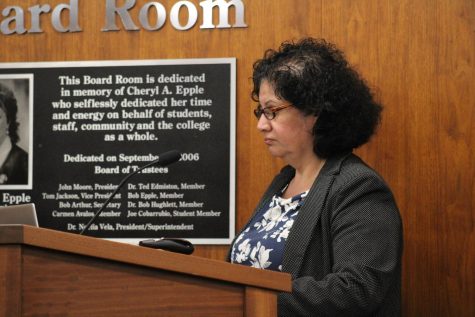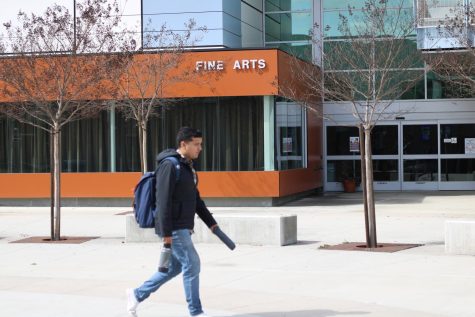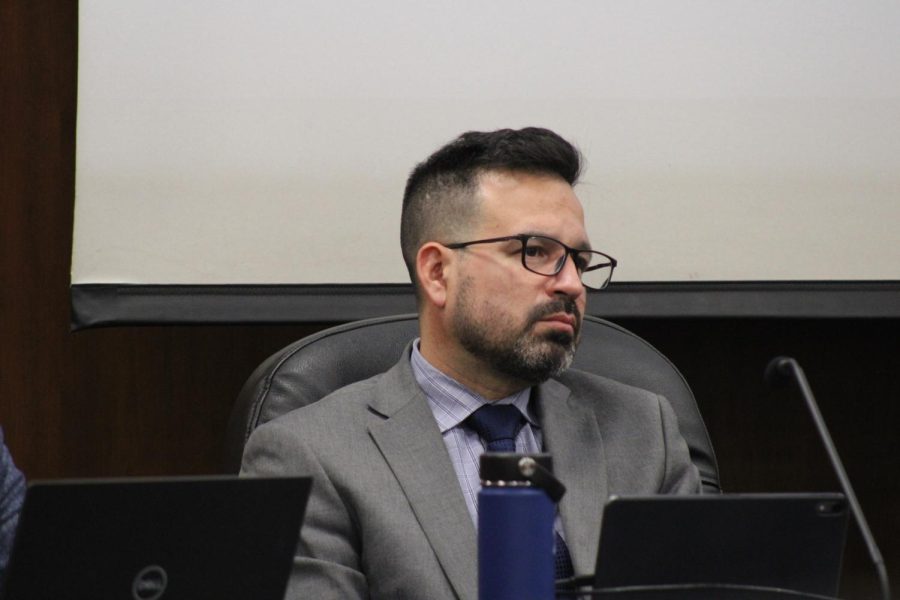The Cerritos Board of Trustees has proposed a new policy that would prevent classified staff from holding part-time teaching positions. The policy was slated for implementation on Jan. 1 but was delayed until Aug. 1.
A classified staff member is defined by the state of California as an employee who holds a position that does not require certification.
According to multiple faculty and staff, Human Resources was the one that created the new policy.
What we do know for sure is that the people impacted by this were notified by Human Resources, according to a district employee who asked to remain anonymous.
Vice President of Human Resources Mercedes Gutierrez declined to comment via email and in person, saying she could not discuss personnel matters.

According to Political Science professor Terrance Mullins, there was no effort from the board of trustees to inform faculty and staff of the policy with the exception of a letter sent out by H.R. to impacted staff.
There was no plan in place to support affected departments, and there was no consultation with the Cerritos College Faculty Federation, Mullins said.
“My sense is that, from the district’s perspective from administration, this is a done deal and programs just have to deal with it,” Mullins said.
The Faculty Senate has requested that Gutierrez attend a meeting to shed some light on the inner workings and thought process behind the Board of Trustees’ policy, but has refused the Senate’s request, according to an anonymous professor.
This took place during the March 8 Faculty Senate meeting and the interaction can be found in the minutes.
Faculty at Cerritos say the new policy will cause a reduction in teaching opportunities and put courses in jeopardy.
“It really depends on the department and how many of their faculty may be affected by this policy, so, I really can’t speak for other departments, in my department we have one faculty member who may be affected by the policy,” said one anonymous professor.
They say that it would be possible to find other people to teach impacted classes in their department, but that is not the case in other departments.
“It’s pretty straightforward that they’ve announced this policy and some people are justifiably upset about it because it is going to lead to particular individuals not being able to continue to teach or have to teach less than they have,” the anonymous professor says.
“And in some cases, it’s going to mean that classes that were offered may not be offered and students will be deprived of the experiences that they’d have,” they added.
The policy would impact a variety of departments according to the Cerritos College Faculty Federation, including Political Science, Business Communications Office Technology, Journalism & Media Studies, Earth Science, Kinesiology, Law/Paralegal, Physics, and Real Estate departments.

ASCC student government representatives say they support classified staff teaching courses.
ASCC put out a resolution (JR-2223-11) titled, “Supporting Faculty Demands on Staff-Faculty Dual Roles.”
JR-2223-11 supports the Faculty Senate’s resolution to support part-time faculty and their opposition to Cerritos College’s board policy, which would “bar current full-time classified staff and managers from serving as part-time/adjunct faculty at Cerritos College outside of their current working hours.”
The ASCC policy also included a response made by Cerritos College President Jose Fierro during a Coordinating Committee meeting on March 20.
“President/Superintendent Jose Fierro rejected the concerns of the Faculty Senate,” the ASCC resolution points out, “Stating that the policy would not change and that the college would just hire new faculty to replace those ejected as a result of the policy.”
Amy Parker, the ASCC cabinet member who put out the resolution, vowed to fight for a change to the policy.
“I’m glad that the students are standing in solidarity with faculty just as we’ve always done to protect their rights and our future,” Parker said.
As for what the student Senate can do, Parker said that the Student senate can’t do much to work with majors that are primarily affected.
“There’s not much we can do if the Board doesn’t change,” Parker explains, “They wield all the power – other than making it very clear that this is not okay.”
Parker ended her comment by saying, “This is yet another example of the college acting like a business and not a public institution.”
ASCC’s Joint Resolution 2223-11 passed ASCC’s cabinet with a unanimous 14 “yes” votes and is currently on its way to the ASCC senate for final approval so it can officially go to the Board of Trustees.
The ASCC senate recently moved to end the discussion and didn’t vote on Joint Resolution 2223-11 during the April 12 ASCC senate meeting but wasn’t put on the agenda during April 19 senate meeting.
















